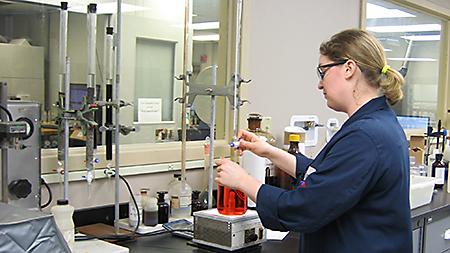wet chemistry testing – wet chemistry vs dry chemistry
Wet Chemistry, also called wet chemical analysis, generally refers to chemistry performed on samples in the liquid phase, Since wet chemistry analysis is performed on liquid samples, this type of element analysis can often be performed on samples too small for other instrumental methods,
What is Wet Chemistry? Wet chemistry encompasses a wide range of ASTM tests in which the majority of analysis occurs while chemicals are in the liquid phase, Wet chemistry is a form of analytical chemistry, meaning it is concerned with the composition and structure of matter, Wet chemistry is commonly referred to as bench chemistry, since the test methods are often performed at lab benches,
Wet Chemistry Testing

Wet chemistry
Techniques used in wet chemistry include: Limit test- determination that if present an analyte does not exceed a specific level, It is done by comparing the Titrimetry- determination of analyte present in a sample by employing a chemical reaction between a titrant of known
Accurate analysis: NIRS versus wet chemistry
· Fichier PDF
Reliable Wet Chemistry Testing
Wet chemistry refers to that branch of qualitative and quantitative analytical testing which employs ‘classical’ laboratory techniques such as extractions, the inducing of chemical reactions, performing titrations, observing colorimetric reactions and changes of physical state, and thin layer chromatography TLC,
Wet Chemical Analysis
Polyhedron Laboratories performs wet chemistry analysis according to ASTM standards, such as Acrylic Acid ASTM D 4094, % Ash ASTM D 297, % Carbon Black ASTM D 297, Part 38 and ASTM D 1603 and Isocyanate Amine Equivalence ASTM D 5155, Polyhedron also offers additional wet chemistry testing including Double Bonds by m-chloroperoxybenzoic Acid Oxidation and High Pressure Polymer Hydrolysis and Titration for …
wet chemistry testing
wet chemistry testing Browsing, Wet Chemistry Techniques By Professor Imtiaz, Wet Chemistry or Wet Chemistry Techniques are used… Search Entire Free Resources, Search for: Latest , What is Solvent in Chemistry? Buffer Solutions: Henderson’s Equation, How Does Environmental Science involve Geology And Chemistry? What is Energy in Chemistry? Common Ion Effect, Most Search terms, Analytical
Wet Chemistry, ICP Chemistry
Classical Wet Chemistry, Classical wet chemistry may be qualitative or quantitative in nature, Qualitative wet chemistry tests aim to identify a particular substance and/or assess whether or not a particular chemical or compound is present in a sample, Quantitative wet chemistry, on the other hand, uses basic laboratory techniques e,g,, manual titrations in order to determine the amount of a particular analyte in a sample,
Auteur : Craig Weiss
What is Wet Chemistry & Wet Chemistry Techniques
Wet chemistry, or general chemistry, describes a wide-range of classical chemical analyses, including: Gravimetric; Titrimetric; Colorimetric ; Combustion techniques; SGS wet chemistry testing, SGS offers a wide variety of analyses, including tests for: pH; Turbidity
Wet Chemistry Testing – GALBRAITH LABORATORIES INC,
Wet chemistry is a form of analytical chemistry that uses classical methods such as observation to analyze materials It is called wet chemistry since most analyzing is done in the liquid phase Wet chemistry is also called bench chemistry since many tests are performed at lab benches,
to testing forages and feeds: wet chemistry and NiR or NiRS Near infrared Reflectance Spectroscopy Understanding the differences and when to use each is important for obtaining the best information for the testing dollar spent, Wet chemistry methods are the most accurate at analyzing feeds
Wet Chemistry Testing & Wet Chemical Analysis
Reliable Wet Chemistry Testing: Our Capabilities
Wet Chemistry Analysis
Some uses for wet chemistry include tests for: pH acidity, alkalinity concentration conductivity Specific Conductance cloud point nonionic surfactants hardness melting point solids or dissolved solids salinity specific gravity density turbidity viscosity moisture Karl Fischer titration
Wet Test Wet Chemistry Vs Dry Test Dry Chemistry
Wet Chemistry When precision and accuracy of results is paramount to your materials testing needs, NSL Analytical will utilize Classical Wet Chemistry, NSL chemists will use these methods for quantitative chemical measurements of a variety of elements when the accuracy of your results is most critical,
Identification testing uses wet chemical techniques to identify raw materials, These tests are sometimes used to distinguish between various salt forms,
wet chemistry testing